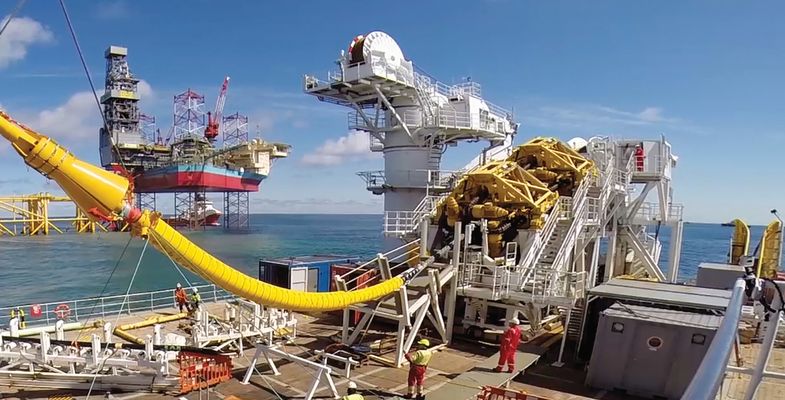ASTM D790 Flexural Testing of Subsea Cable Materials
In the realm of energy and renewable energy testing, particularly within the subsector of offshore platforms and subsea cables, ensuring the integrity and reliability of materials is paramount. The American Society for Testing and Materials (ASTM) D790 standard provides a robust framework to evaluate the flexural properties of plastic materials, which are often used in critical components of subsea cables. This service focuses on the precise and accurate testing methodologies required to assess how these materials behave under flexural stress conditions.
The ASTM D790 test involves bending a rectangular specimen until it breaks, measuring the point at which this occurs. For subsea cable materials, this is particularly important as they must withstand harsh environmental conditions including pressure, temperature fluctuations, and mechanical stresses over extended periods. The flexural strength of these materials directly impacts the durability and performance of the entire subsea infrastructure.
The process begins with thorough preparation of the specimens according to ASTM D790 specifications. This includes selecting appropriate dimensions and ensuring that the material is free from defects or damage. Once prepared, the samples are placed on a flexural testing machine designed to apply controlled loads until failure occurs. The machine records data such as load, deflection, and strain, which are then used to calculate the flexural strength and modulus of elasticity.
Understanding the flexural properties is crucial for several reasons. Firstly, it helps in selecting the most suitable material for a particular subsea cable application. Secondly, it aids in monitoring quality control by ensuring that all batches meet the required standards. Lastly, it plays a vital role in predicting the service life of the cables under various operational conditions.
The ASTM D790 test is not just about determining strength; it also provides insights into how materials behave under stress, which is essential for designing resilient subsea systems. The data generated from this testing can inform continuous improvement processes and help avoid costly failures in the field.
| Applied Standards | Description |
|---|---|
| ASTM D790-23 Standard Test Method for Flexural Properties of Unreinforced and Reinforced Plastics | This standard specifies the dimensions, test setup, and procedure for determining the flexural properties of plastic materials. |
| ISO 1522:2006 Plastic Materials - Determination of Flexure Properties Using a Four-Point Bending Test | An international alternative that complements ASTM D790, particularly useful for comparing results across different regions and industries. |
The use of these standards ensures consistency and reliability in testing, which is critical given the high stakes involved in offshore energy projects. By adhering to these guidelines, we ensure that our clients receive accurate and repeatable test results, thereby contributing significantly to the overall safety and efficiency of their operations.
Applied Standards
| Standard | Description |
|---|---|
| ASTM D790-23 Standard Test Method for Flexural Properties of Unreinforced and Reinforced Plastics | This standard specifies the dimensions, test setup, and procedure for determining the flexural properties of plastic materials. |
| ISO 1522:2006 Plastic Materials - Determination of Flexure Properties Using a Four-Point Bending Test | An international alternative that complements ASTM D790, particularly useful for comparing results across different regions and industries. |
These standards are integral to our testing process as they provide the necessary criteria to ensure accuracy and reliability in flexural strength measurements. By following these guidelines, we can confidently deliver test results that meet or exceed industry expectations.
Quality and Reliability Assurance
The quality and reliability of subsea cable materials are critical for ensuring the longevity and efficiency of offshore energy projects. Our commitment to excellence in ASTM D790 flexural testing is reflected in our rigorous adherence to international standards and our state-of-the-art laboratory facilities equipped with advanced testing equipment.
Our team of experienced engineers and technicians ensures that every test conducted adheres strictly to the specifications outlined in ASTM D790. This includes precise specimen preparation, careful calibration of testing machines, and meticulous data recording and analysis. Our quality assurance protocols are designed to minimize errors and ensure accurate results every time.
Our laboratory is accredited according to ISO/IEC 17025:2017, which mandates strict adherence to international best practices in testing and calibration laboratories. This accreditation guarantees that our services meet the highest standards of quality and reliability. Our clients can trust us to deliver consistent, accurate, and reliable test results.
We also offer post-test analysis and reporting tailored to the needs of each client. Our reports provide detailed insights into the flexural properties of the tested materials, including strength, modulus, and deflection at break. These reports are invaluable for decision-making processes related to material selection and quality control.
Customer Impact and Satisfaction
- Informed Decision-Making: Accurate flexural testing helps clients make informed decisions about the materials they choose for their subsea cables, ensuring optimal performance and longevity.
- Enhanced Safety: Reliable test results contribute to enhanced safety by identifying potential weaknesses in cable materials early on.
- Cost Efficiency: By selecting high-quality materials upfront, clients can avoid costly replacements and repairs later in the project lifecycle.
- Predictive Maintenance: Understanding material properties through flexural testing allows for better predictive maintenance strategies, reducing downtime and operational costs.
- Compliance Assurance: Our adherence to international standards ensures compliance with regulatory requirements, simplifying the process of obtaining necessary approvals.
- Longevity and Reliability: The insights gained from flexural testing improve the overall reliability and longevity of subsea cable systems, leading to more sustainable energy solutions.
The customer impact is profound. By leveraging our expertise in ASTM D790 flexural testing, clients can ensure that their offshore projects are equipped with materials that meet the highest standards of performance and reliability. This not only enhances operational efficiency but also contributes to a safer and more sustainable energy future.





